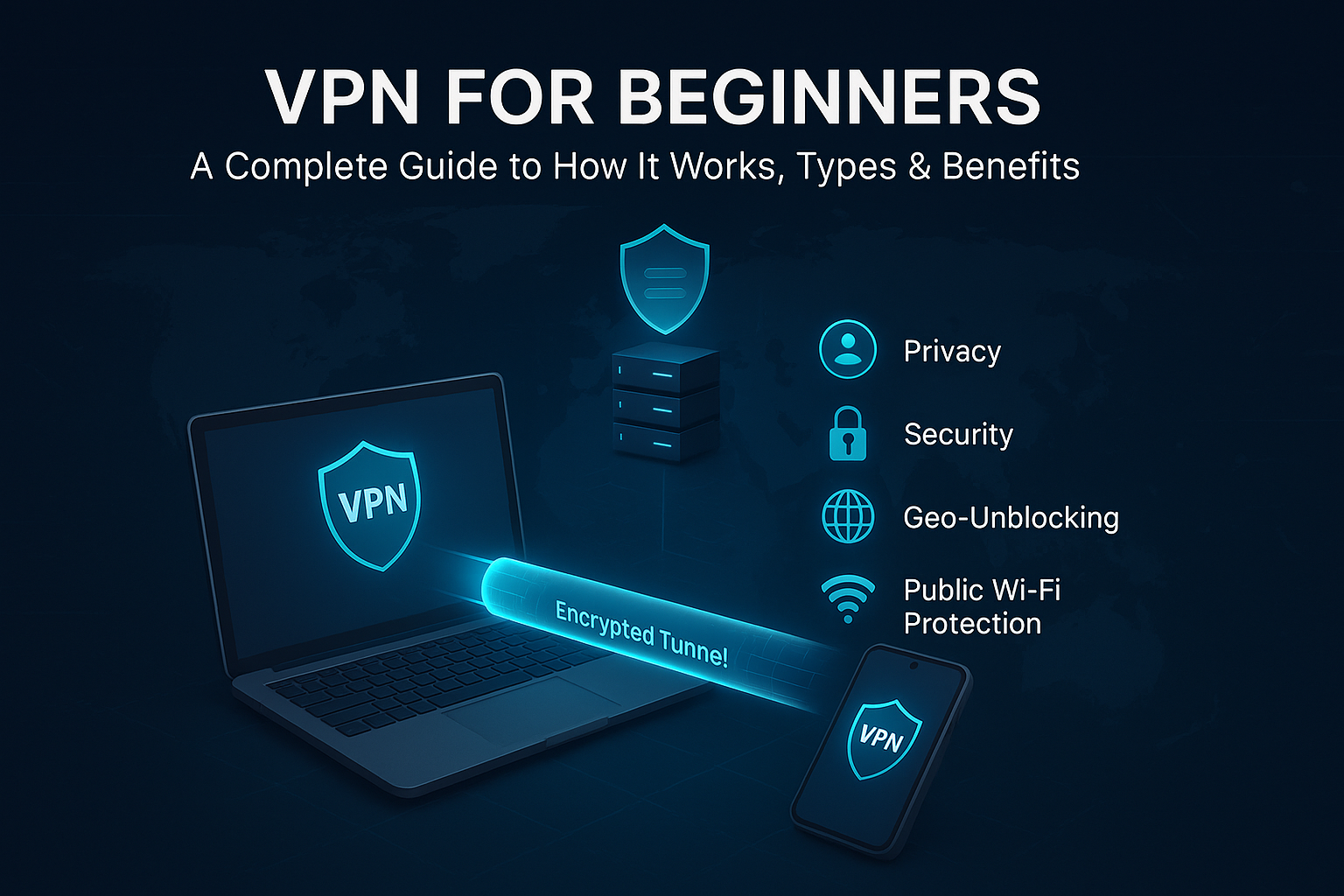What is a VPN?
A VPN (Virtual Private Network) is a tool that helps protect your privacy and keeps your online activities secure. When you use the internet, your data such as passwords, messages, and browsing history travels through networks where it can be tracked, logged, or even stolen. This is where a VPN comes in.
The full form of VPN is Virtual Private Network. It works by creating a secure and encrypted “tunnel” between your device like a phone, laptop, or tablet and the internet. Once the VPN is active, your real IP address is hidden and replaced by an IP from a different location, giving you anonymity and security while browsing.
In simple terms, a VPN makes it seem like you’re using the internet from another country or city while shielding your data from prying eyes like hackers, advertisers, or even government surveillance.
How Does a VPN Work?
When you turn on a VPN, it begins to encrypt your internet traffic. This means it converts your data into unreadable code so that nobody else can understand or misuse it. That encrypted data is then sent through a secure tunnel to a remote VPN server. From there, it accesses the internet.
Let’s break this down further.
Encryption and Tunneling
- Encryption scrambles your data, making it useless to hackers or trackers unless they have a secret key which they don’t.
- Tunneling refers to the private path your data takes between your device and the VPN server. It prevents any outsider like a Wi-Fi hotspot provider or ISP from seeing what you’re doing.
Choosing a VPN Server
You can pick from servers in various countries. The server location you choose determines your virtual IP address.
- For faster speeds, select a server close to your actual location.
- To unlock region-restricted content like US Netflix or UK’s BBC iPlayer, choose a server based in those countries.
Types of VPNs
VPNs come in different types, depending on how they’re used and who they’re meant for. Here are the most common types.
1. Remote Access VPN
This type is often used by employees working from home. It allows a secure connection to a company’s internal systems from any remote location, ensuring that confidential work files stay safe.
2. Site-to-Site VPN
Used mostly by businesses, this VPN connects two or more office networks. It helps companies with multiple locations share data and resources securely as if they were on the same network.
3. Mobile VPN
Designed for smartphones and tablets, mobile VPNs keep your connection stable even as you move between networks like from Wi-Fi to mobile data. It’s ideal for people who are constantly on the go.
4. Personal VPNs
This is the type most individuals use. It focuses on personal online privacy, security, and access to global content. Whether you’re streaming shows, shopping online, or browsing social media, a personal VPN ensures your data remains private.
Benefits of Using a VPN
Using a VPN isn’t just for tech experts or businesses anymore. Everyday internet users now rely on VPNs for a variety of important reasons.
Online Privacy
A VPN stops your ISP, websites, and apps from tracking your browsing habits. It keeps your search history, website visits, and downloads hidden, even from advertisers and big tech companies.
Bypass Geo-Restrictions
Ever seen a message like “This content is not available in your region”? A VPN solves this problem. It changes your virtual location, letting you access websites and content from any region.
- Watch Netflix US from India
- Stream BBC iPlayer from the US
- Play region-locked games or access apps only available in certain countries
Public Wi-Fi Security
Using free Wi-Fi at airports, cafes, or hotels? These networks are often unprotected. A VPN encrypts your data so even if someone tries to snoop, they’ll see nothing but encrypted code.
Prevent Data Throttling
Some ISPs slow down your internet if you stream a lot or use certain apps. A VPN hides your online activities from your ISP, helping you maintain consistent speeds.
Disadvantages of Using a VPN
While VPNs offer many benefits, they do have a few limitations you should be aware of.
Reduced Internet Speed
Because your data is being encrypted and rerouted through a VPN server, you might notice a slight drop in speed. This can affect downloads, video calls, or streaming quality especially on slower internet connections.
Legal Restrictions
In some countries, VPN use is heavily restricted or even banned. Examples include China, Russia, Iran, and North Korea. Using a VPN in these regions could be illegal, so always check local laws before using one.
Free VPN Risks
While tempting, free VPNs can be dangerous. Some
- Log and sell your data
- Display intrusive ads
- Lack strong encryption
- May contain malware
A paid VPN is almost always a better and safer choice.
Conclusion
A VPN is an essential tool for privacy, security, and freedom in today’s digital age. Whether you’re new to the idea or just starting to explore it, understanding how a VPN works can empower you to take better control of your internet experience.
To recap:
- It protects your identity and browsing habits.
- Lets you stream and access content worldwide.
- Shields you on public networks.
- Gives you back control over your data.
Getting Started Tip: Choose a reputable VPN provider like NordVPN, ExpressVPN, or Surfshark, install their app, select a server, and enjoy the benefits of a secure and open internet.


